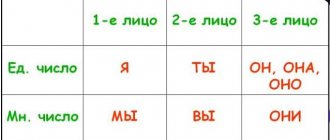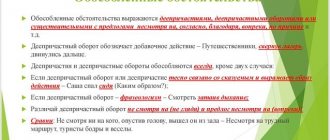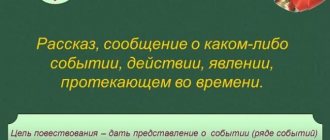Independent work on the topic “Pronouns” in 6th grade test in the Russian language (6th grade) on the topic
Option I
1. Decline pronouns: she, you, we.
2. Open the brackets.
As for (me), (I) don’t like apples. (Are you) so comfortable? I (you) are listening. These are (he) things, don't touch anything here. I called, but (they) weren’t at home. For (they) this is very important. With (he) I will go to the concert.
3. Underline the pronouns as parts of the sentence.
He was so good. I saw them in the cinema yesterday. Will you come to us today? I have important business for you.
4. Parse the sentences from task 3.
Option II
1. Determine the case of pronouns.
There were two of them, you like it, come with me, I see her, she has work to do today, this doesn’t suit me, I don’t want to, don’t think about them, can I come with you?
2. Decline the pronouns: it, you, I.
3. Come up with several sentences (at least four) in which the pronouns would be different members.
4. Do a syntactic analysis of the resulting sentences.
Option I
1. Decline pronouns: she, you, we.
2. Open the brackets.
As for (me), (I) don’t like apples. (Are you) so comfortable? I (you) are listening. These are (he) things, don't touch anything here. I called, but (they) weren’t at home. For (they) this is very important. With (he) I will go to the concert.
3. Underline the pronouns as parts of the sentence.
He was so good. I saw them in the cinema yesterday. Will you come to us today? I have important business for you.
4. Parse the sentences from task 3.
Option II
1. Determine the case of pronouns.
There were two of them, you like it, come with me, I see her, she has work to do today, this doesn’t suit me, I don’t want to, don’t think about them, can I come with you?
2. Decline the pronouns: it, you, I.
3. Come up with several sentences (at least four) in which the pronouns would be different members.
4. Do a syntactic analysis of the resulting sentences.
Option I
1. Decline pronouns: she, you, we.
2. Open the brackets.
As for (me), (I) don’t like apples. (Are you) so comfortable? I (you) are listening. These are (he) things, don't touch anything here. I called, but (they) weren’t at home. For (they) this is very important. With (he) I will go to the concert.
3. Underline the pronouns as parts of the sentence.
He was so good. I saw them in the cinema yesterday. Will you come to us today? I have important business for you.
4. Parse the sentences from task 3.
Option II
1. Determine the case of pronouns.
There were two of them, you like it, come with me, I see her, she has work to do today, this doesn’t suit me, I don’t want to, don’t think about them, can I come with you?
2. Decline the pronouns: it, you, I.
3. Come up with several sentences (at least four) in which the pronouns would be different members.
4. Do a syntactic analysis of the resulting sentences.
Option I
1. Decline pronouns: she, you, we.
2. Open the brackets.
As for (me), (I) don’t like apples. (Are you) so comfortable? I (you) are listening. These are (he) things, don't touch anything here. I called, but (they) weren’t at home. For (they) this is very important. With (he) I will go to the concert.
3. Underline the pronouns as parts of the sentence.
He was so good. I saw them in the cinema yesterday. Will you come to us today? I have important business for you.
4. Parse the sentences from task 3.
Option II
1. Determine the case of pronouns.
There were two of them, you like it, come with me, I see her, she has work to do today, this doesn’t suit me, I don’t want to, don’t think about them, can I come with you?
2. Decline the pronouns: it, you, I.
3. Come up with several sentences (at least four) in which the pronouns would be different members.
4. Do a syntactic analysis of the resulting sentences.
Option I
1. Decline pronouns: she, you, we.
2. Open the brackets.
As for (me), (I) don’t like apples. (Are you) so comfortable? I (you) are listening. These are (he) things, don't touch anything here. I called, but (they) weren’t at home. For (they) this is very important. With (he) I will go to the concert.
3. Underline the pronouns as parts of the sentence.
He was so good. I saw them in the cinema yesterday. Will you come to us today? I have important business for you.
4. Parse the sentences from task 3.
Option II
1. Determine the case of pronouns.
There were two of them, you like it, come with me, I see her, she has work to do today, this doesn’t suit me, I don’t want to, don’t think about them, can I come with you?
2. Decline the pronouns: it, you, I.
3. Come up with several sentences (at least four) in which the pronouns would be different members.
4. Do a syntactic analysis of the resulting sentences.
Option I
1. Decline pronouns: she, you, we.
2. Open the brackets.
As for (me), (I) don’t like apples. (Are you) so comfortable? I (you) are listening. These are (he) things, don't touch anything here. I called, but (they) weren’t at home. For (they) this is very important. With (he) I will go to the concert.
3. Underline the pronouns as parts of the sentence.
He was so good. I saw them in the cinema yesterday. Will you come to us today? I have important business for you.
4. Parse the sentences from task 3.
Option II
1. Determine the case of pronouns.
There were two of them, you like it, come with me, I see her, she has work to do today, this doesn’t suit me, I don’t want to, don’t think about them, can I come with you?
2. Decline the pronouns: it, you, I.
3. Come up with several sentences (at least four) in which the pronouns would be different members.
4. Do a syntactic analysis of the resulting sentences.
Option I
1. Decline pronouns: she, you, we.
2. Open the brackets.
As for (me), (I) don’t like apples. (Are you) so comfortable? I (you) are listening. These are (he) things, don't touch anything here. I called, but (they) weren’t at home. For (they) this is very important. With (he) I will go to the concert.
3. Underline the pronouns as parts of the sentence.
He was so good. I saw them in the cinema yesterday. Will you come to us today? I have important business for you.
4. Parse the sentences from task 3.
Option II
1. Determine the case of pronouns.
There were two of them, you like it, come with me, I see her, she has work to do today, this doesn’t suit me, I don’t want to, don’t think about them, can I come with you?
2. Decline the pronouns: it, you, I.
3. Come up with several sentences (at least four) in which the pronouns would be different members.
4. Do a syntactic analysis of the resulting sentences.
Option I
1. Decline pronouns: she, you, we.
2. Open the brackets.
As for (me), (I) don’t like apples. (Are you) so comfortable? I (you) are listening. These are (he) things, don't touch anything here. I called, but (they) weren’t at home. For (they) this is very important. With (he) I will go to the concert.
3. Underline the pronouns as parts of the sentence.
He was so good. I saw them in the cinema yesterday. Will you come to us today? I have important business for you.
4. Parse the sentences from task 3.
Option II
1. Determine the case of pronouns.
There were two of them, you like it, come with me, I see her, she has work to do today, this doesn’t suit me, I don’t want to, don’t think about them, can I come with you?
2. Decline the pronouns: it, you, I.
3. Come up with several sentences (at least four) in which the pronouns would be different members.
4. Do a syntactic analysis of the resulting sentences.
Option I
1. Decline pronouns: she, you, we.
2. Open the brackets.
As for (me), (I) don’t like apples. (Are you) so comfortable? I (you) are listening. These are (he) things, don't touch anything here. I called, but (they) weren’t at home. For (they) this is very important. With (he) I will go to the concert.
3. Underline the pronouns as parts of the sentence.
He was so good. I saw them in the cinema yesterday. Will you come to us today? I have important business for you.
4. Parse the sentences from task 3.
Option II
1. Determine the case of pronouns.
There were two of them, you like it, come with me, I see her, she has work to do today, this doesn’t suit me, I don’t want to, don’t think about them, can I come with you?
2. Decline the pronouns: it, you, I.
3. Come up with several sentences (at least four) in which the pronouns would be different members.
4. Do a syntactic analysis of the resulting sentences.
Option I
1. Decline pronouns: she, you, we.
2. Open the brackets.
As for (me), (I) don’t like apples. (Are you) so comfortable? I (you) are listening. These are (he) things, don't touch anything here. I called, but (they) weren’t at home. For (they) this is very important. With (he) I will go to the concert.
3. Underline the pronouns as parts of the sentence.
He was so good. I saw them in the cinema yesterday. Will you come to us today? I have important business for you.
4. Parse the sentences from task 3.
Option II
1. Determine the case of pronouns.
There were two of them, you like it, come with me, I see her, she has work to do today, this doesn’t suit me, I don’t want to, don’t think about them, can I come with you?
2. Decline the pronouns: it, you, I.
3. Come up with several sentences (at least four) in which the pronouns would be different members.
4. Do a syntactic analysis of the resulting sentences.
Option I
1. Decline pronouns: she, you, we.
2. Open the brackets.
As for (me), (I) don’t like apples. (Are you) so comfortable? I (you) are listening. These are (he) things, don't touch anything here. I called, but (they) weren’t at home. For (they) this is very important. With (he) I will go to the concert.
3. Underline the pronouns as parts of the sentence.
He was so good. I saw them in the cinema yesterday. Will you come to us today? I have important business for you.
4. Parse the sentences from task 3.
Option II
1. Determine the case of pronouns.
There were two of them, you like it, come with me, I see her, she has work to do today, this doesn’t suit me, I don’t want to, don’t think about them, can I come with you?
2. Decline the pronouns: it, you, I.
3. Come up with several sentences (at least four) in which the pronouns would be different members.
4. Do a syntactic analysis of the resulting sentences.
Option I
1. Decline pronouns: she, you, we.
2. Open the brackets.
As for (me), (I) don’t like apples. (Are you) so comfortable? I (you) are listening. These are (he) things, don't touch anything here. I called, but (they) weren’t at home. For (they) this is very important. With (he) I will go to the concert.
3. Underline the pronouns as parts of the sentence.
He was so good. I saw them in the cinema yesterday. Will you come to us today? I have important business for you.
4. Parse the sentences from task 3.
Option II
1. Determine the case of pronouns.
There were two of them, you like it, come with me, I see her, she has work to do today, this doesn’t suit me, I don’t want to, don’t think about them, can I come with you?
2. Decline the pronouns: it, you, I.
3. Come up with several sentences (at least four) in which the pronouns would be different members.
4. Do a syntactic analysis of the resulting sentences.
Option I
1. Decline pronouns: she, you, we.
2. Open the brackets.
As for (me), (I) don’t like apples. (Are you) so comfortable? I (you) are listening. These are (he) things, don't touch anything here. I called, but (they) weren’t at home. For (they) this is very important. With (he) I will go to the concert.
3. Underline the pronouns as parts of the sentence.
He was so good. I saw them in the cinema yesterday. Will you come to us today? I have important business for you.
4. Parse the sentences from task 3.
Option II
1. Determine the case of pronouns.
There were two of them, you like it, come with me, I see her, she has work to do today, this doesn’t suit me, I don’t want to, don’t think about them, can I come with you?
2. Decline the pronouns: it, you, I.
3. Come up with several sentences (at least four) in which the pronouns would be different members.
4. Do a syntactic analysis of the resulting sentences.



